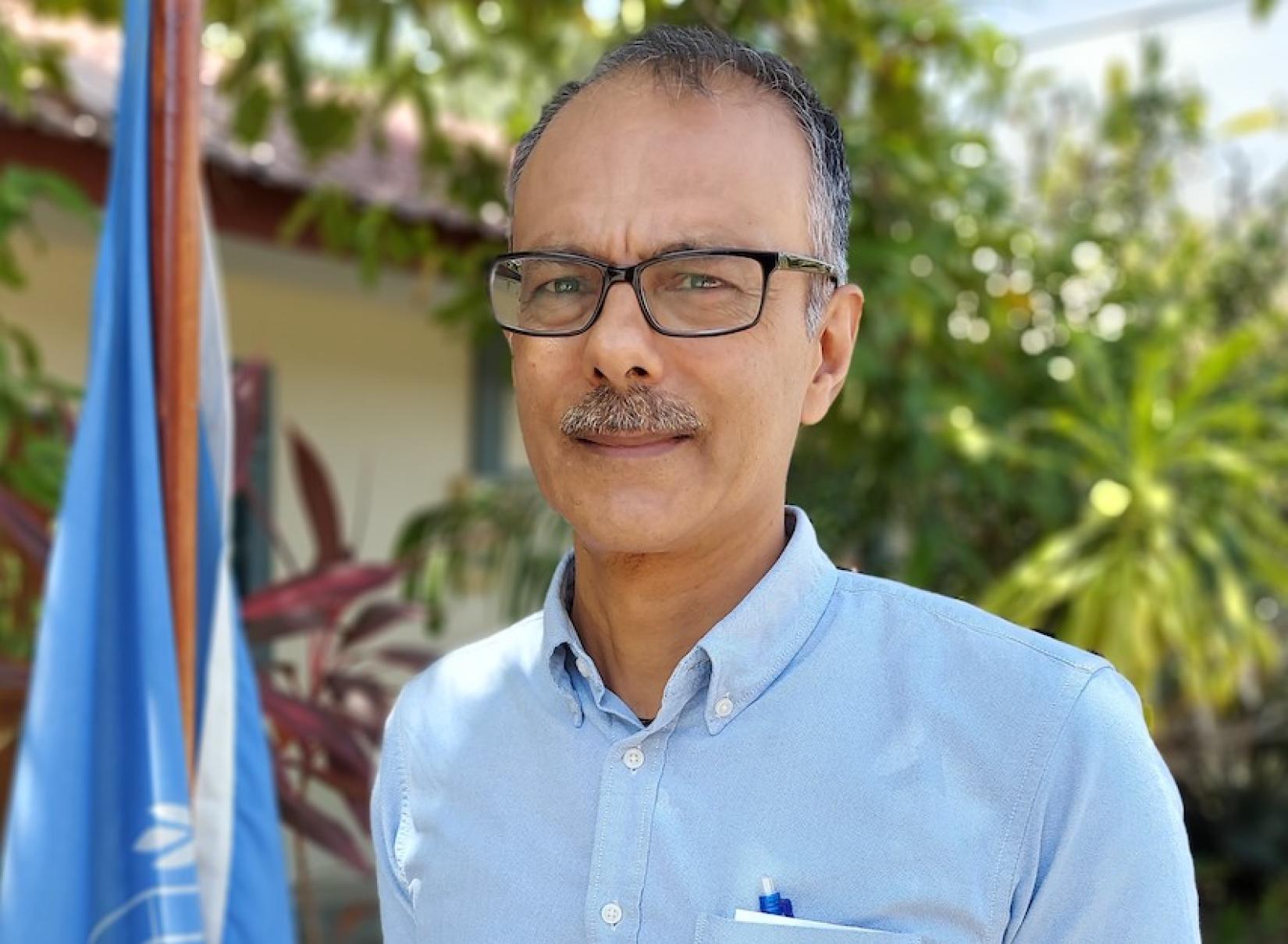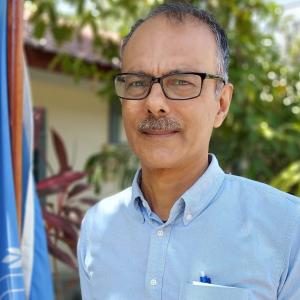UN Resident Coordinator's Remarks on Symposium on Human Fraternity for World Peace and Living Together
UN Resident Coordinator's Remarks on Symposium on Human Fraternity for World Peace and Living Together

UN Resident Coordinator's Remarks on
Symposium on Human Fraternity for World Peace and Living Together
20 September 2022, UCT, Balide, Dili, 9:00am – 12:00pm
Your Excellency President Dr Jose Ramos-Horta,
Your Excellency Archbishop Edgar Pena Parra, Deputy Prime Minister (Substitute of the Secretariat of State of the Holy See),
Your Excellency Monsignor Marco Sprizzi, Chargé d'affaires of Holy Sea in TimorLeste,
Your Excellency Mrs Maria Domingas Fernandes Alves, Representative of the Civil Society,
Honourable Professor Dr Joel Cassimiro Pinto
Distinguished Professors, staff and students of the University
Ladies and Gentlemen,
Good morning, And let me begin by thanking all of the organisers of this very important event. It is a great honour and privilege to contribute to this august event in my role as the United Nations Resident Coordinator in Timor-Leste.
In preparation for my remarks today, I drew inspiration from Article 1 of the Universal Declaration of Human Rights. The UDHR is a milestone document in the history of human rights. Drafted by representatives with different legal and cultural backgrounds from all regions of the world, the Declaration was proclaimed by the United Nations General Assembly in Paris on 10 December 1948 as a common standard of achievements for all peoples and all nations (regardless of race, ethnicity, gender, abilities or other characteristics). For the first time, it sets out fundamental human rights that must be universally protected, and it has been translated into 500 languages.
The UDHR states: "All human beings are born free and equal in dignity and rights. They are endowed with reason and conscience and should act towards one another in a spirit of brotherhood."
The Global Sustainable Development Goals, agreed by world leaders in 2015, are also built on the basic premise that the future of humanity is interdependent and interconnected. Peace, security and sustainable development can only be achieved through collective efforts. Saint Francis of Assisi, in his book "The Art and Architecture of Peace", reiterates that the "path to peace does not mean making society blandly uniform but getting people to work together, side by side, in pursuing goals that benefit everyone".
Religious leaders and prophets from all faiths have emphasised a similar message of peace, love, and fraternity for hundreds of years.
In February 2019 - two great religious leaders, Pope Francis and the Grand Imam of Al-Azhar Ahmed Al-Tayeb, representing different faiths, manifested their belief in these human values in one extraordinary Document that they co-authored as a mark of their beliefs and commitment to fraternity, world peace and living in harmony.
In Timor-Leste, ladies and gentlemen, our visionary President, Dr Jose Ramos Horta, reminded us all about this Declaration earlier this year. Later, the National Parliament unanimously approved the Document on 12 May. The Parliament also declared its commitment to the values of global peace, dialogue and respect for human rights, and the Parliament urged the Government and all citizens to promote the importance of human fraternity, starting at domestic level but extending through practical actions, to all levels of society with the aim of improving the welfare of all citizens, and at the multilateral level, by adopting "protective conduct that promotes peaceful coexistence among peoples."
His Excellency President Dr José Ramos-Horta, on the occasion of his oath-taking as President of the Republic, recommitted to making every effort to adapt and include the Document in school curricula.
Excellencies, ladies and gentlemen, perhaps the most significant and enduring legacy that any one of us can leave on the Earth is a life of peace and to demonstrably promote human fraternity and kindness through our individual actions.
Why is this important? Because history reminds us that without peace, there can be no sustainable development; conversely, without sustainable development, there can be no enduring peace!
But, the reality in our world today is that we continue to live in a world characterised by conflicts, pandemics, climate changes, and violence (sadly also including inter-faith conflicts) that continue to cause enormous suffering, scar the lives of many of the poorest and most vulnerable people and restrict local, national and global development. We were all humans until gender, race, relision and caste separated us, politic divided us, and wealth classified us. The UN Secretary General recently said: "Our world is blighted by war, battered by climate chaos, scarred by hate, and shamed by poverty & hunger. We need to come together around solutions - and we need to give hope."
So how can we put the principles of fraternity into practice?
Let me suggest four ways in which we can all contribute.
First, we need to be at genuine peace as individuals ourselves. Without this, human beings will continue to constantly rival each other. The practice of yoga, meditation, mindfulness, and other cultural and religious rituals teach us the importance of promoting peace in ourselves. Even a few minutes of quiet contemplation and reflection each day can benefit each and everyone one of us.
Secondly, the importance of inter-faith dialogue and action to recognise the valuable contribution that people of all religions and beliefs can make to humanity and the contribution that dialogue between faith groups can contribute to increased awareness and understanding of the shared values of humankind.
Thirdly, I would underline the importance of inclusion by raising awareness about different cultures and religions or beliefs and promoting tolerance, which involves societal acceptance and respect for religious and cultural diversity, including religious expression. Education, in particular at schools and colleges, must contribute meaningfully to promoting tolerance and eliminating discrimination based on religion, beliefs, abilities, gender, or other differences. As human beings, we have more in common than any of these 'differences that keep us apart. We must encourage activities that foster tolerance, pluralistic traditions, mutual respect and the diversity of beliefs to actively promote genuine human fraternity at the regional, national and local levels.
Fourthly, just as we commit to human fraternity, we also need to commit to protecting and supporting other life forms on our planet! Our lives depend not just on other human beings but on the beautiful flora and fauna that inhabit the Earth. If human beings continue to destry the natural world, our own existence will continue to be threatened. We must promote better custodianship of our planet!
By following these basic principles, I believe we can build a better world for all and do more to promote cultural and religious tolerance, understanding and dialogue in Timor-Leste.
Finally, let me propose that we can all put some of these principles into action by doing at least one act of kindness every day for someone who is a stranger (a person who is not your friend or family).
The United Nations in Timor-Leste stands ready to work with the President, the Parliament, the Government and all sections of society, including religious leaders to strengthen inter-faith and intercultural dialogue to enhance mutual respect and cultural diversity.
Viva TimorLeste!
Speech by






